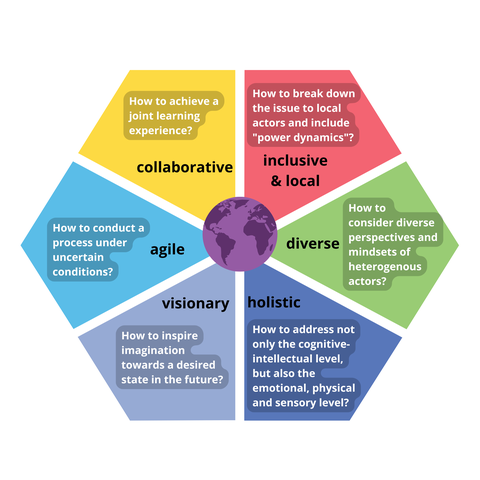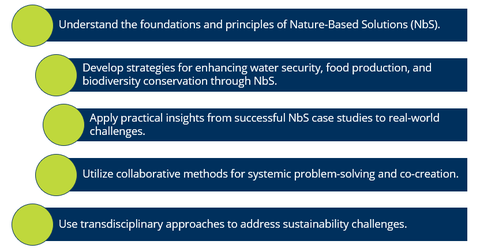Alumni seminar: Nature-based Solution: Enhancing the Water-Food-Biodiversity Nexus
Duration: November 23, 2025 – December 14, 2025 (on-site in Dresden)
Interactive full-time seminar with in-depth guidance and opportunities for alumni to collaborate and strengthen professional networks.
Motivation
In today’s interconnected world, the need for integrated and transdisciplinary approaches to address sustainability challenges is more pressing than ever. Traditional disciplines such as forestry, hydrology, conservation, and landscape planning must adapt to new collaborative and holistic strategies. This shift requires scientists, policymakers, industry leaders, and civil society representatives to transcend disciplinary boundaries and work together to develop sustainable solutions for resource management.
Nature-based Solutions (NbS) have emerged as an innovative approach to address key global challenges by harnessing the power of ecosystems. By integrating NbS into the Water-Food-Biodiversity Nexus, the seminar aims to contribute to the achievement of the UN Sustainable Development Goals (SDGs) and the broader 2030 Agenda.
This alumni seminar focuses on advancing knowledge and practical skills related to NbS, emphasizing their role in water management, food security, and biodiversity conservation. Participants will be equipped with the tools to leverage ecosystems for delivering essential services, enhancing climate resilience, and fostering synergies between environmental conservation and human welfare.
A core component of the seminar is collaborative problem-solving and co-creation, using a dialogue model developed in cooperation with the German Environment Agency (UBA), the Global Diplomacy Lab (GDL), and CIPSEM alumni. Participants will engage in peer-to-peer consultations, applying structured methods to analyse and develop solutions for sustainability challenges they face in their professional contexts.

Figure 1: Intensive peer consultation on challenges shared by the participants will reveal new perspectives during the alumni seminar. The process will be guided by a simple but effective dialogue model jointly developed by the German Environment Agency (Umweltbundesamt), the Global Diplomacy Lab (GDL), CIPSEM, UNEP/UNESCO/BMUV alumni and an engaged community of practice and presented at the Hamburg Sustainability Conference 2024. Knowing how to apply the tools of the dialogue model enables participants to conduct co-creation processes on their own.
Seminar concept and objectives
This seminar offers a comprehensive and interactive learning experience on NbS within the Water-Food-Biodiversity Nexus. It combines expert inputs, case studies, and practical applications with collaborative and participatory problem-solving approaches.
Key elements of the seminar:
- Lectures and case studies from TUD Dresden University of Technology faculty and international experts on NbS.
- Field excursions showcasing NbS applications in water management, agriculture, and biodiversity conservation.
- Application of the dialogue model to analyse real-world challenges and develop innovative solutions.
- Peer-to-peer consultations, enabling participants to exchange experiences and co-develop strategies for implementing NbS in their home countries.
- Collaborative learning sessions, including poster presentations and impulse talks by alumni, to strengthen South-South-North knowledge exchange.
- Mentored development of Post-Training Action Plans (PTAPs) to facilitate the application of acquired knowledge in professional practice.
Upon completion of the seminar, participants will be able to
Target groups
This seminar is exclusively open to alumni of the UNEP/UNESCO/BMUV course program run by CIPSEM. It is designed for professionals working in environmental management, policy-making, research, and implementation of sustainable development strategies.
Participants should have:
- A strong professional interest in Nature-Based Solutions and their practical implementation.
- A willingness to engage in peer-learning and co-creative problem-solving.
- Adequate English language skills to actively participate in discussions and group work.
What makes participating in this course impactful?
- Experience of the CIPSEM team in conducting engaging and meaningful trainings tailored to the challenges in developing countries and emerging economies.
- A full-time, 2-week learning experience combining expert input, field excursions, and group work with guided self-study units.
- Renowned international and German facilitators providing insights and guidance.
- Peer-learning and exchange, fostering deep connections and knowledge-sharing among international experts.
- Enhance cross-cohort ties: Strengthen your connections with CIPSEM alumni from diverse cohorts, fostering new opportunities for collaboration, knowledge exchange, and joint problem-solving.
- Mentored development of Post-Training Action Plans (PTAPs) for effective knowledge transfer and application.
- Opportunity to apply for Transfer-to-Action Fellowships (TAF) of €2,000 to support the implementation of PTAPs.
Fellowship opportunities
The program can award 21 fully funded fellowships, covering:
✔️ Accommodation in comfortable single studio apartments;
✔️ Local public transport;
✔️ All tuition fees, including excursions;
✔️ Round-trip flights from the participant's country of origin to Dresden;
✔️ Insurance;
✔️ €310 contribution toward living expenses.
Application and participation
🔹 Who can apply?
This seminar is open to alumni of the UNEP/UNESCO/BMUV course program run by CIPSEM who are actively working on topics related to Nature-Based Solutions and the Water-Food-Biodiversity Nexus. Applicants must reside and work in a DAC-listed country and be 55 years or younger at the time of application. We are looking for professionals eager to exchange knowledge, collaborate across disciplines, and apply seminar insights to real-world challenges.
🔹 What to prepare?
As part of your application, please describe a Nature-Based Solutions (NbS) challenge you are currently facing in your professional work. This should be a real-world issue related to water management, food security, or biodiversity conservation that you would like to explore through structured peer consultations during the seminar. Clearly outline the challenge, why it matters, and how engaging with fellow alumni could help develop potential solutions.
🔹 Application period:
📅 11 March – 14 April 2025 (via CIPSEM’s online application portal)
🔹 Selection process & participation:
The Steering Committee will select 21 participants by June 2025. Selected participants will be informed via email.
Please note that the duration stated at the beginning corresponds to the financing period. This includes the seminar period from 27 November to 10 December 2025, as well as four days for arrival before the seminar starts and four days for departure after it ends.
🔹 Certification:
Successful participants will receive a Certificate of Participation.
► If you have an important question that is not addressed on our website or in the help texts within the application form, please contact us at . Before reaching out, we ask you to check the resources provided thoroughly.


